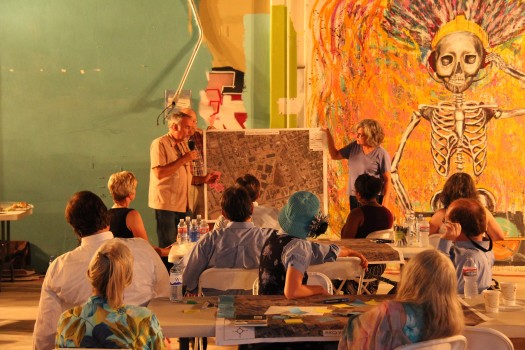A Placemaking Journal
Charrette: A Social Innovation Lab
When you think social innovation, you might think micro loans in developing countries, or hand-ups to help people in from the fringes here at home. Or a wide range of ways to build social capital or how charitable institutions backstop community with philanthropy. But for those of you who are working in the city planning trenches every day, using collaborative design workshops to engage the people, you’re really running a form of social innovation lab.
You’re drawing from diverse perspectives, co-creating solutions, and taking on a systems approach to problem solving. You’re helping the community use design thinking married up to community development to tell their own stories and make their own places, inviting participants who will use the design to be part of its creation process. You’re asking someone to help set the table, instead of inviting them to dinner that’s already been set. Making for more durable solutions to social innovation. And for way more resilient places.
Because urban design is an iterative process – design, make, evaluate – design workshops have the feel of makerspace. But the social innovation part recognizes the swarm mentality, acknowledging that none of us are as smart as all of us.
Social innovation is a strategy to strengthen civil society. Social innovation only grows in the context of community – the art and act of belonging – building trust and relationships.

The old African proverb got it right when it advised, “If you want to go fast, go alone. If you want to go far, go together.” Government’s role in social innovation is to convene the conversations to move us forward, together. And the conversation has to last long enough – often four or five consecutive days of a design workshop or charrette – to go deep enough to make a difference.
The goal of most placemakers is to help communities come together to build the trusting relationships that make for resilient places. This sort of transparent planning in a collaborative format to build livable, loveable places is really our definition of placemaking.
The Surrey Social Innovation Summit in British Columbia where I served as a panelist a couple months ago was a delightful connection with a diverse group of people defining and working on this topic, but not many of us were coming from a city planning perspective. While social innovation is basically how we lead our professional lives as placemakers, we need to do a better job of connecting to the networks of social service providers and economic developers who are advancing the conversation in their own ways.
Social innovation studies and supports the conditions that allow human beings to flourish, to bring in our community members from the margins. It’s all about outcomes: get lean, get going, and share.
Our recent mass exodus to entrepreneurship is a major threat to living wages, because we entrepreneurs tend to exploit ourselves. That exploitation is even worse when we are social entrepreneurs, who daily provide a free public service of some sort or another. Depending on the nature and tenor of your social media practice, our heightened number of social connections there can handily make social entrepreneurs out of most of us. It is precarious work.
If social innovation does not change equity, it isn’t worth doing. Must be anchored to clear, definable objectives. True social innovation is transformational. Gives people more dignity. Helps people get where they’re going, faster.
Innovation, like development, is connecting elements we already have in new ways. When those new ways combine organizations or disciplines that haven’t been working together, that’s when paradigms shift. And it isn’t working together for one gig that makes a difference, but the innovation sticks when the new relationships last. When the trust builds. When the connections multiply. When community forms, and strengthens.
If PlaceShakers is our soapbox, our Facebook page is where we step down, grab a drink and enjoy a little conversation. Looking for a heads-up on the latest community-building news and perspective from around the web? Click through and “Like” us and we’ll keep you in the loop.









